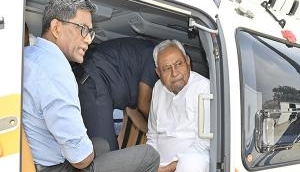Cow slaughter: why Himachal High Court's ruling is troubling

Just when the politics of beef has become a communal flashpoint, the Himachal Pradesh High Court's direction to the central government to consider enacting a law against cow slaughter has added fuel to the fire.
Ruling on a writ petition filed by theBhartiya Govansh Rakshan Sanverdhan Parishad, the court also told the government to consider imposing a total ban on the sale, export and import of beef and beef products within the next three months.
The court, which is constitutionally bound to protect the rights of religious and cultural minorities,stated that because butchers (mainly Muslim) might lose their fundamental right to livelihood or Dalits (for whom beef is a staple diet) might be "inconvenienced"should not come in the way of a complete ban on cow slaughter.
This at a time when "cow protection" vigilantes are running amok, beating up the transgressors and even killing them.
In arriving at its decision, the court relied upon a smorgasbord of sources - Hindu scriptures, Constituent Assembly debates and the Supreme Court's judgment in State of Gujarat versus Mirzapur Moti Mahal Kureshi Jamaat , 2005.
In the 2005 case, the Supreme Court had observed that cow dung and urine are vital to India's economy and upheld the ban on cow slaughter on certain days of the year (mostly on days of Jain and Hindu festivals) in Gujarat.
As for the Constituent Assembly debates, the high court relied upon the speeches of Seth Govind Dass, who had asserted that protecting the cow was integral to the practice of Hinduism, and since Hindus formed the majority of the country's population the cow must enjoy constitutional protection. For this purpose, he had proposed Article 38A to the Draft Constitution, which eventually became Article 48 of the Constitution. It enjoins upon all Indian citizens the responsibility to protect the cow.
The State shall endeavour to organise agriculture and animal husbandry on modern and scientific lines and shall, in particular, take steps for preserving and improving the breeds, and prohibiting the slaughter, of cows and calves and other milch and draught cattle.
Dass had also asserted that consumption of beef was alien to the "Indian culture", and "culture is a gift of history and consequently no other culture can be imposed upon it". The statement is inaccurate, and not many would disagree that it smacks of Hindu majoritarianism.
Interestingly, the high court also favourably accepted an affidavit from DP Amin, joint director at the Department of Animal Husbandry, Gujarat. In his submission, Amin contended that cow dung and urine were more precious than the Kohinoor diamond, hence the cow must be protected at all costs, even if it is no longer productive due to advanced age, ill health, or some other reason.
An intriguing aspect of the high court's judgment lies in Para 66. Therein, it states that the cow is considered "property", and since the 44th Constitutional amendment downgraded the right to property from a fundamental right - non-derogable except under exceptional circumstances -- to a legal right, people can't complain if their ageing cattle are taken away to gaushalas.
Several activists who are litigating against cow slaughter bans told Catch that the high court ruling was unfortunate; it could potentially further fan the fires raging in the name of the holy cow.
Hopefully, the ruling would be appealed in the Supreme Court for it's quite troubling.
First published: 31 July 2016, 11:52 IST





![BJP's Kapil Mishra recreates Shankar Mahadevan’s ‘Breathless’ song to highlight Delhi pollution [WATCH] BJP's Kapil Mishra recreates Shankar Mahadevan’s ‘Breathless’ song to highlight Delhi pollution [WATCH]](https://images.catchnews.com/upload/2022/11/03/kapil-mishra_240884_300x172.png)

![Anupam Kher shares pictures of his toned body on 67th birthday [MUST SEE] Anupam Kher shares pictures of his toned body on 67th birthday [MUST SEE]](https://images.catchnews.com/upload/2022/03/07/Anupam_kher_231145_300x172.jpg)

